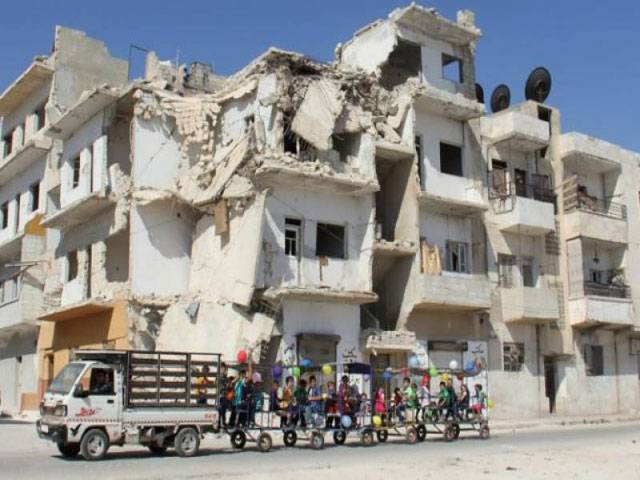ASTANA, Kazakhstan - Russia, Iran and Turkey struck a deal Friday to jointly police a fourth safe zone around Syria's Idlib province as part of a Moscow-led plan to ease the six-year conflict.
In a joint statement after two days of talks in Kazakhstan, the three powers said they agreed "to allocate" their forces to patrol the zone covering rebel-held Idlib province and parts of the neighbouring Latakia, Hama and Aleppo regions.
The talks in Astana, the Kazakh capital, are the sixth round of negotiations Moscow has spearheaded since the start of the year as it seeks to pacify Syria after its game-changing intervention on the side of leader Bashar al-Assad.
Regime backers Russia and Iran and rebel supporter Turkey agreed in May to set four "de-escalation zones" in rebel-held territory around Syria to halt fighting between the government and moderate opposition.
Since then Russia has forged ahead with establishing three of the zones on the ground by deploying military police to patrol the boundaries of safe areas in the south of Syria, in Eastern Ghouta near Damascus, and in part of the central Homs province.
However, the three powers had struggled to agree the details of the final zone around Idlib on the border with Turkey, as Ankara and Tehran vied to expand their influence.
Idlib was captured in 2015 by an alliance of jihadists and rebels and remains beyond the control of the government.
The statement Friday said Russian, Iranian and Turkish forces would be deployed according to maps agreed earlier this month in Ankara, the Turkish capital, but gave no further details of their exact positions or the timing.
A joint Russia-Turkish-Iranian coordination centre will be set up "aimed at coordinating the activities of de-escalation forces", the joint declaration said. Russia's chief negotiator Alexander Lavrentyev hailed the deal as the "final stage" in the creation of the four safe zones, insisting it would "create a real path to the cessation of bloodshed" and offer hope for "a return to peaceful life".
Nevertheless, Lavrentyev, acknowledged there remains a "long journey ahead to strengthen trust" between Assad's government and the armed opposition, both of whom sent delegations to the negotiations. Regime representative Bashar al-Jaafari said Damascus "supports any initiative in Syria that stops the shedding of Syrian blood and decreases suffering".
A statement on its Facebook page said that the armed opposition noted that no "monitoring mechanism" had been agreed for the new zone in Idlib.
"Assad's forces or militias will not be present in any area or part of the de-escalation zones and will not have a role in our liberated zones," the statement said.
On the ground the "de-escalation zones" have already seen fighting drop and allowed Damascus and Moscow to turn more of their firepower against jihadists from the Islamic State group.
The participants agreed to a fresh round of talks in Astana in October.
The United Nations envoy for Syria Staffan de Mistura called to "bring the momentum of Astana" to broader talks on finding a political solution to the war that the UN has hosted without much success in Geneva.
"No de-escalation can be sustained without a comprehensive political process, and that is based in Geneva," he said.
Some observers have viewed the Astana process as a means for Russia, Iran and Turkey to keep the West on the sidelines of any resolution to the Syrian conflict that has already led to the loss of over 330,000 lives.
Meanwhile, the United Nations said Friday that its first aid convoy in three years had reached Syria's Deir Ezzor city via road after government troops broke a jihadist siege last week.
Trucks carrying "life-saving items" like wheat flour, canned foods and nutrition and maternal health items for 15,000 families reached Deir Ezzor on Thursday, UN humanitarian agency spokesman Jens Laerke told reporters in Geneva.
"This is the first UN aid delivered by road to Deir Ezzor since the city was retaken," he told reporters in Geneva.
While the first from the UN, the convoy was not the first to reach the city since the siege was broken on September 5, with trucks carrying in food aid from the Syrian Trade Association last week.
And the some 100,000 people who were estimated to be trapped in the government-held area during the siege that began in 2014 were not completely cut off from aid before then.
The UN carried out 309 successful airdrops of aid during the siege, Laerke said Friday.
The Syrian government was also able to periodically bring in supplies by helicopter.
The UN refugee agency said Friday that it had sent in five trucks carrying shelter materials, plastic sheeting and solar lamps for 30,000 people.
More than 330,000 people have been killed in Syria since the conflict began in March 2011 with anti-government protests before spiralling into a bloody civil war.






